Deck 12: Abuse and Discrimination
Question
Question
Question
Question
Question
Question
Question
Question
Question
Question
Question
Question
Question
Question
Question

Unlock Deck
Sign up to unlock the cards in this deck!
Unlock Deck
Unlock Deck
1/15
Play
Full screen (f)
Deck 12: Abuse and Discrimination
1
How is social impairment different from stigma?
Impairments are of several kinds including mental impairment, cognitive impairment, emotional impairment, social impairment, and cultural impairment. Social impairment and stigma are closely related.
When a person is unable to fit in normally into the society in which he lives, it is called social impairment. Stigma is a feeling of disgrace associated with a particular circumstance in the society. While social impairment is an individual situation that obstructs full community gratification, stigma is a complex developed due to negative thinking that certain conditions are accepted as reasonable by a society and you don't fall into that category. Unlike social impairment, stigma can result in over compensation, denial, rationalization, and inversion. Stigma may be revealed in a society (e.g., stuttering) or may remain hidden (e.g., an epileptic person). But social impairment is always obvious (like height or skin color).
When a person is unable to fit in normally into the society in which he lives, it is called social impairment. Stigma is a feeling of disgrace associated with a particular circumstance in the society. While social impairment is an individual situation that obstructs full community gratification, stigma is a complex developed due to negative thinking that certain conditions are accepted as reasonable by a society and you don't fall into that category. Unlike social impairment, stigma can result in over compensation, denial, rationalization, and inversion. Stigma may be revealed in a society (e.g., stuttering) or may remain hidden (e.g., an epileptic person). But social impairment is always obvious (like height or skin color).
2
Refer to Case Study 12-1. If you were the dential assistant, how would you have acted. What if Judith just said she "fell"? Would you explore the issue any further?
(In Reference Case Study 12-1)
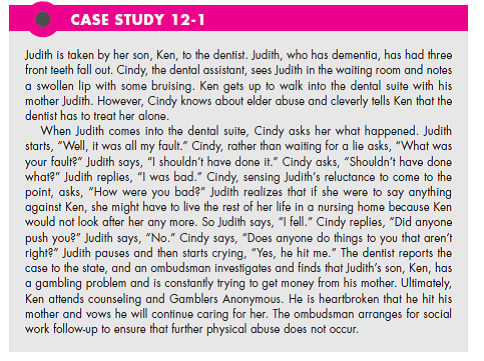
(In Reference Case Study 12-1)

Elderly people are abused not only at home but also in nursing homes and long-term care facilities. Abuse to the elderly can lead to serious physical injuries and long-term psychological consequences.
The case mentioned clearly shows that the elderly woman (Judith) was abused at home by her son (Ken). But she is denying the abuse since she is worried if she said anything against her son she would be abandoned. Cindy, the dental assistant did the right thing reporting the case to the State. Anyone in her position would have acted the same. If Judy said she fell, as a dental assistant one should certainly look deeper into the matter and take necessary actions. If still she is denying the fact, the dental assistant should advise her that any kind of abuse like hitting or pushing is not the right thing and should not be kept hidden as it does not help her but rather makes the abuse worse. Hence, the best way is to report the matter and there are policies regarding such offences.
The case mentioned clearly shows that the elderly woman (Judith) was abused at home by her son (Ken). But she is denying the abuse since she is worried if she said anything against her son she would be abandoned. Cindy, the dental assistant did the right thing reporting the case to the State. Anyone in her position would have acted the same. If Judy said she fell, as a dental assistant one should certainly look deeper into the matter and take necessary actions. If still she is denying the fact, the dental assistant should advise her that any kind of abuse like hitting or pushing is not the right thing and should not be kept hidden as it does not help her but rather makes the abuse worse. Hence, the best way is to report the matter and there are policies regarding such offences.
3
Define abuse, neglect, and exploitation.
Abuse, neglect, and exploitation are experienced by five to twenty percent of the people. Health professionals identify the signs and symptoms of abuse not only to help them but also to strengthen their defenses.
• Abuse: It is the deliberate activity of physical or mental agony through demonstration of commission or exclusion. It includes withdrawal of services essential for maintaining health. Abuse may be physical, verbal, mental, or health abuse.
• Neglect: It is the deliberate infliction of physical or mental agony through acts of exclusion. It particularly include withdrawal of services essential for maintaining health. It is the state of being uncared for which can result in carelessness, reluctance, or indifference. In the case of elders who needs care, they are intentionally or unintentionally abandoned. Infants too who are dependent on parents or elders are also neglected.
• Exploitation: It is the process of taking advantage of another person. Elderly are often exploited for personal or financial gain. Even if the victim has given consent, their trust or incompetence are often misused by the gainer. Similarly, children and spouse are also exploited for different purposes.
• Abuse: It is the deliberate activity of physical or mental agony through demonstration of commission or exclusion. It includes withdrawal of services essential for maintaining health. Abuse may be physical, verbal, mental, or health abuse.
• Neglect: It is the deliberate infliction of physical or mental agony through acts of exclusion. It particularly include withdrawal of services essential for maintaining health. It is the state of being uncared for which can result in carelessness, reluctance, or indifference. In the case of elders who needs care, they are intentionally or unintentionally abandoned. Infants too who are dependent on parents or elders are also neglected.
• Exploitation: It is the process of taking advantage of another person. Elderly are often exploited for personal or financial gain. Even if the victim has given consent, their trust or incompetence are often misused by the gainer. Similarly, children and spouse are also exploited for different purposes.
4
Refer to Case Study 12-2. How do you feel aboutMaria? Are you sympathetic? Do you feel guilty for feeling sympathetic?
(In Reference Case Study 12-2)
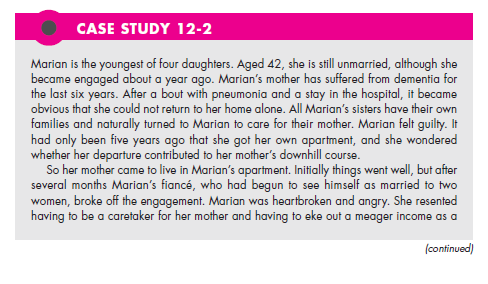
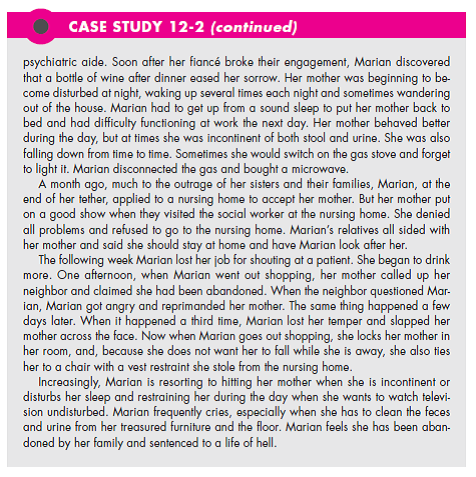
(In Reference Case Study 12-2)



Unlock Deck
Unlock for access to all 15 flashcards in this deck.
Unlock Deck
k this deck
5
What does "physical, chemical, or emotional restraint" mean?

Unlock Deck
Unlock for access to all 15 flashcards in this deck.
Unlock Deck
k this deck
6
In reference to Case Study 12-3 in which Carla denies spouse abuse to the dietician, what do you think happened to Carla? Lay out a likely scenario of what happened and where she ended up. Why do you think she came for dietary counseling?
(In Reference Case Study 12-3)
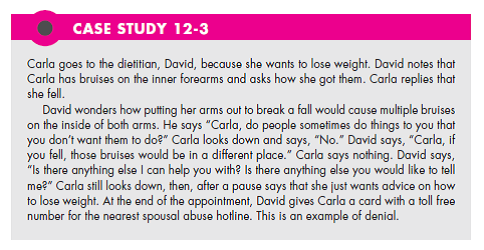
(In Reference Case Study 12-3)


Unlock Deck
Unlock for access to all 15 flashcards in this deck.
Unlock Deck
k this deck
7
List types of abuse.

Unlock Deck
Unlock for access to all 15 flashcards in this deck.
Unlock Deck
k this deck
8
Refer to Case Study 12-4. Did Angela do the right thing to report the case to DCF? What if there were no previous records and the family sued for wrongful accusation? Should Angela have sought more evidence before referring Tommy to DCF?
(In Reference Case Study 12-4)
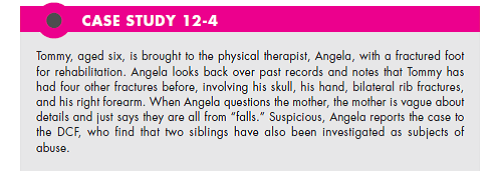
(In Reference Case Study 12-4)


Unlock Deck
Unlock for access to all 15 flashcards in this deck.
Unlock Deck
k this deck
9
What are the two theories explaining abuse?

Unlock Deck
Unlock for access to all 15 flashcards in this deck.
Unlock Deck
k this deck
10
List three situations in which denial is commonly used.

Unlock Deck
Unlock for access to all 15 flashcards in this deck.
Unlock Deck
k this deck
11
What is the difference between assault and battery?

Unlock Deck
Unlock for access to all 15 flashcards in this deck.
Unlock Deck
k this deck
12
How should a health professional behave when a 13-year-old girl asks for treatment of venereal disease or help with an abortion? Should the case be discussed with the parent first?

Unlock Deck
Unlock for access to all 15 flashcards in this deck.
Unlock Deck
k this deck
13
List the five main recipients of abuse.

Unlock Deck
Unlock for access to all 15 flashcards in this deck.
Unlock Deck
k this deck
14
To which agency should each of these instances of abuse be reported?

Unlock Deck
Unlock for access to all 15 flashcards in this deck.
Unlock Deck
k this deck
15
What is mental incompetence?

Unlock Deck
Unlock for access to all 15 flashcards in this deck.
Unlock Deck
k this deck


